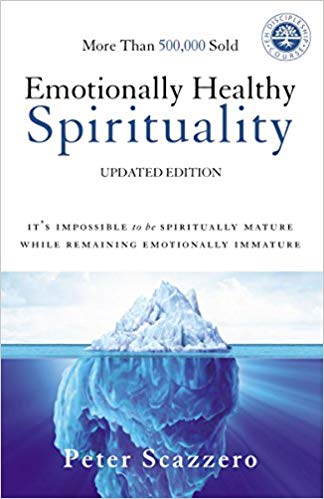Peter Scazzero was a megachurch pastor in New York and seemed to be a model of spiritual leadership and maturity. The problem is that he was emotionally immature, with deep-seated issues from his childhood that had never been dealt with. Moreover, all of Peter’s church activity merely masked over his emotional problems. It took some life-shattering events in his family before Scazzero realized that spiritual health is integrally related to emotional health.
Peter Scazzero tells this story in his book Emotionally Healthy Spirituality: It’s Impossible to Be Spiritually Mature, While Remaining Emotionally Immature. Through transparent descriptions of his own journey, Scazzero shows the deep link between spiritual and emotional maturity.
In the first chapter Scazzero observed that often we can use our spiritual activities to hide our emotional brokenness:
“[T]he spirituality of most current discipleship models often only adds an additional protective layer against people growing up emotionally. Because people are having real, and helpful, spiritual experiences in certain area of their lives–such as worship, prayer, Bible studies, and fellowship–they mistakenly believe they are doing fine, even if their relational life and interior world is not in order. This apparent ‘progress’ then provides the spiritual reason for not doing the hard work of maturing.”
My own Eastern Orthodox tradition has often avoided many of the bifurcations that are common in Evangelicalism, and our spiritual literature tends to assume a deep organic relationship between spiritual maturity, emotional maturity, doctrine, and metaphysics. Yet the strong emphasis in Orthodoxy on ascetic practices can provide ample opportunity for “going through the motions” while keeping one’s spiritual life separate from emotional wholeness.
Emotionally Healthy Spirituality isn’t the deepest book on this subject, but it is a good place to start for anyone wanting to let their relationship with Christ permeate into every aspect of their life.


 “[T]he spirituality of most current discipleship models often only adds an additional protective layer against people growing up emotionally. Because people are having real, and helpful, spiritual experiences in certain area of their lives–such as worship, prayer, Bible studies, and fellowship–they mistakenly believe they are doing fine, even if their relational life and interior world is not in order. This apparent ‘progress’ then provides the spiritual reason for not doing the hard work of maturing.”
“[T]he spirituality of most current discipleship models often only adds an additional protective layer against people growing up emotionally. Because people are having real, and helpful, spiritual experiences in certain area of their lives–such as worship, prayer, Bible studies, and fellowship–they mistakenly believe they are doing fine, even if their relational life and interior world is not in order. This apparent ‘progress’ then provides the spiritual reason for not doing the hard work of maturing.”